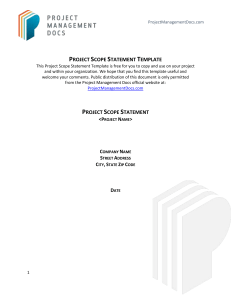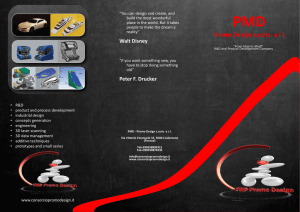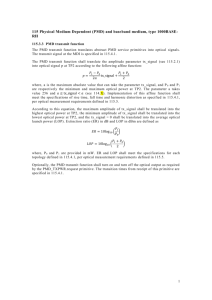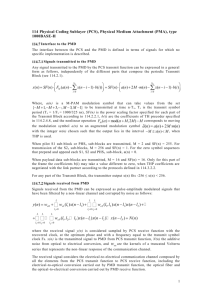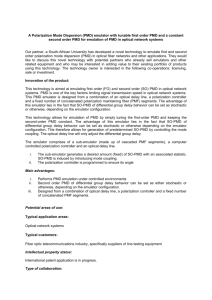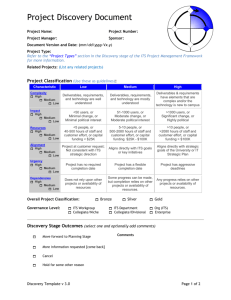Project Scope Statement Template
advertisement
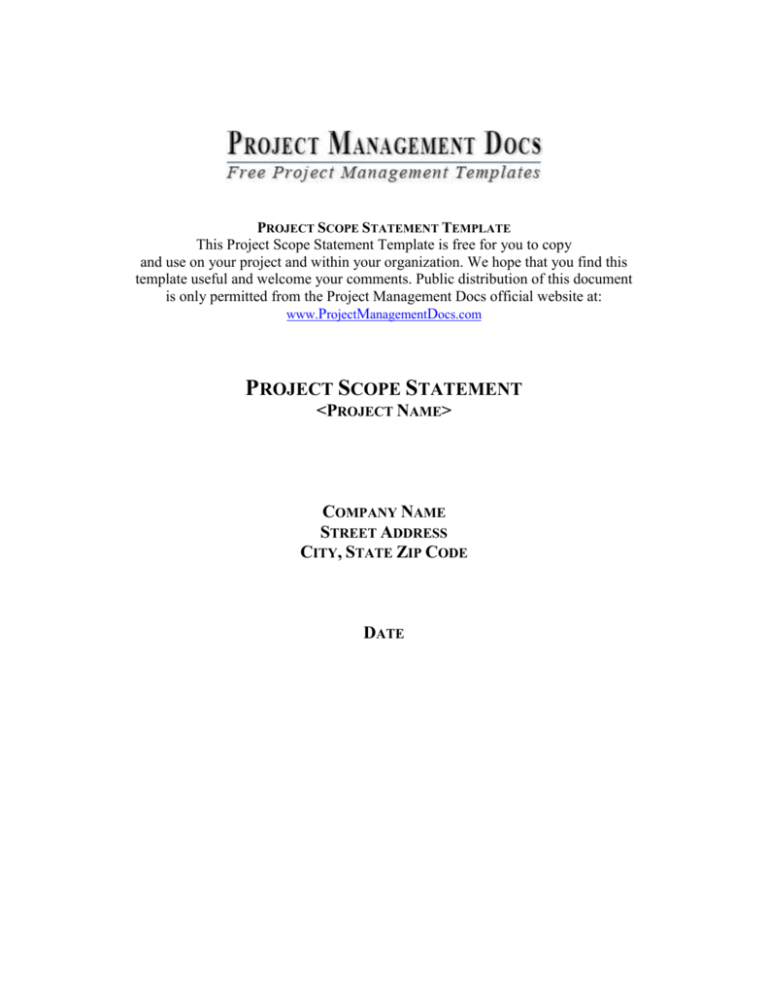
PROJECT SCOPE STATEMENT TEMPLATE This Project Scope Statement Template is free for you to copy and use on your project and within your organization. We hope that you find this template useful and welcome your comments. Public distribution of this document is only permitted from the Project Management Docs official website at: www.ProjectManagementDocs.com PROJECT SCOPE STATEMENT <PROJECT NAME> COMPANY NAME STREET ADDRESS CITY, STATE ZIP CODE DATE Project Scope Statement Template www.ProjectManagementDocs.com TABLE OF CONTENTS INTRODUCTION ................................................................................................................................ 3 PROJECT PURPOSE AND JUSTIFICATION ............................................................................................ 3 SCOPE DESCRIPTION ........................................................................................................................ 4 HIGH LEVEL REQUIREMENTS ........................................................................................................... 4 BOUNDARIES.................................................................................................................................... 4 STRATEGY........................................................................................................................................ 5 DELIVERABLES ................................................................................................................................ 5 ACCEPTANCE CRITERIA ................................................................................................................... 5 CONSTRAINTS .................................................................................................................................. 6 ASSUMPTIONS .................................................................................................................................. 6 COST ESTIMATE ............................................................................................................................... 7 COST BENEFIT ANALYSIS ................................................................................................................ 7 2 Project Scope Statement Template www.ProjectManagementDocs.com INTRODUCTION The purpose of the Project Scope Statement is to provide a baseline understanding of the scope of a project to include the project’s scope and deliverables, the work required to complete the deliverables, and ensure a common understanding of the project’s scope among all stakeholders. The Project Scope Statement defines the following: Purpose and Justification of the Project Scope Description High Level Project Requirements Project Boundaries Project Strategy Project Deliverables Acceptance Criteria Project Constraints Project Assumptions Cost Estimates Cost Benefit Analysis This Project Scope Statement serves as a baseline document for defining the scope of the Acme Consulting Portfolio Management Database (PMD) Project, project deliverables, work which is needed to accomplish the deliverables, and ensuring a common understanding of the project’s scope among all stakeholders. All project work should occur within the framework of the project scope statement and directly support the project deliverables. Any changes to the scope statement must be vetted through the approved Project Change Management Process prior to implementation. This completion date for this project is December 31, 2014. PROJECT PURPOSE AND JUSTIFICATION It is important that project stakeholders understand the purpose and justification of a project. Projects are conceived to support various business goals and objectives and these must be communicated to ensure understanding of how the project will improve business. This also helps stakeholders understand the investments being made and how this translates into better business performance. The PMD Project has been approved to plan, design, build, and implement a new tracking tool for Acme Consulting professionals to manage all current and future programs in its portfolio. The purpose of this project is to centralize Acme’s programs onto one common management platform in order to improve management, resource allocation, and prioritization of its various programs. As a small company, Acme Consulting has historically been challenged with limited resources for managing its various client programs. As a result, some programs have experienced delays, exceeded their budgets, or have not properly met their deliverables. By implementing the PMD Project, Acme Consulting can better leverage its limited resources by establishing program priorities, allocating resources in a more efficient manner, and providing proactive management oversight to help in identifying and mitigating risks before they adversely impact programs. The successful implementation of this project is expected to reduce Acme Consulting’s cost overruns and schedule delays by 30%. 3 Project Scope Statement Template www.ProjectManagementDocs.com SCOPE DESCRIPTION The Scope Description should include all known characteristics of the project’s product or service. It is important to note that as the project moves further along in its lifecycle, this scope description will become more defined. All details may not be known at the onset of the project and this may be progressively elaborated as the project moves forward. This section is key as it serves as a primary reference for project planning and execution later in the lifecycle. This section should contain descriptions of what is included in the product or service as well as the desired outcome of the project. The scope of the PMD Project is to plan, design, build, and implement an Access Database tool on which all Acme Consulting programs will be managed. Various access and permissions will be granted to the appropriate personnel in order to update, manage, and view programs. Each program will incorporate a virtual dashboard with key metrics in order to provide a consistent methodology on which to measure program health and status. Program dashboards will contain schedules, budget data, assigned resources, risks, and milestones for each program. The scope of this project includes all requirements gathering, planning, design, development, and implementation of the PMD tool. HIGH LEVEL REQUIREMENTS This section should describe the capabilities to be met by successful completion of the project. Depending on the size of the project, there may be very many or very few requirements. However, during the creation of the scope statement, it is important to capture, at least, the high level requirements as many detailed requirements may not yet be known. The PMD tool has been approved to meet a business need for Acme Consulting. In order to meet this business need there are several requirements which must be met as part of the successful execution of this project. The following high level requirements have been identified for the PMD Project: Database platform with access granted to all employees Accessible from office or remotely Program template tool to ensure all program dashboards are consistent Ability to maintain tool internally without contract support BOUNDARIES Project boundaries are an important part of the scope statement as they identify what should be included in the project as well as what should not be included. Without specific boundaries as a part of the project scope statement, it is possible to introduce scope creep as stakeholders may assume certain items to be included in the project that aren’t clearly stated. The PMD Project includes all work associated with planning, designing, building, and implementing the PMD Tool for Acme consulting. This includes requirements gathering, gathering input from all departments, conceptual and technical design and coding work, server configuration, testing, troubleshooting, and deployment of the PMD Tool across the organization. This also includes training manuals and materials associated with operating the tool. Not included in the scope of this project are: ongoing maintenance of the system, 4 Project Scope Statement Template www.ProjectManagementDocs.com implementing commercial database products, ongoing help desk and/or service support, or hardware/software upgrades. STRATEGY This section should describe the strategy the project team will use in executing the project. Depending on the size and complexity of the project, strategy can differ significantly. As the number of stakeholders, deliverables, and complexity grow, the strategy may become more difficult to plan. Strategy is sometimes referred to as the approach the team will take to complete the project. For the PMD Project strategy, the project team will leverage the expertise of several database developers from the Acme Consulting Information Technology (IT) group. These experts will be in matrixed support as part of the project team. They will aid the project manager and other team members in conceptual and technical design, coding, server configuration, testing and troubleshooting, and deployment. The project manager will ensure that the IT experts incorporate all input from stakeholders and gathered requirements. DELIVERABLES Project deliverables are the products or outputs that project is intended to produce. Deliverables may also include various reports or documentation. This section should describe the project’s deliverables which may be in general terms and not a high level of detail. During the project lifecycle more detail can be added as it is determined. There are several deliverables which will be produced as a result of the successful completion of the PMD Project. If all of the following deliverables are not met then the project will not be considered successful. The Project Manager is responsible for ensuring the completion of these deliverables. 1. Deliverable 1 – A tested and operational Program Management Database tool free of errors and meeting the specifications described in the Project Scope Description 2. Deliverable 2 – A tested and operational Program template tool (as part of the PMD) which allows users to enter Program data and metrics in a consistent manner 3. Deliverable 3 – A complete and thorough user’s manual which provides step by step instructions on how to use the PMD tool for users of all permission levels 4. Deliverable 4 – A complete and thorough troubleshooting guide which provides corrective steps to users of all permission levels for all anticipated problems ACCEPTANCE CRITERIA Acceptance criteria are the criteria which must be met for the project to be considered complete and accepted by management. This section is important as it sets the expectations of what will and will not constitute acceptance of the project. Without clear definition of what will be accepted, there may be uncertainty across the project team and stakeholders. Acceptance criteria may be both qualitative and quantitative. 5 Project Scope Statement Template www.ProjectManagementDocs.com Acceptance criteria have been established for the PMD Project to ensure thorough vetting and successful completion of the project. The acceptance criteria are both qualitative and quantitative in nature. All acceptance criteria must be met in order to achieve success for this project: 1. Meet all deliverables within scheduled time and budget tolerances 2. Reduce schedule delays by at least 30% 3. Reduce budget overruns by at least 30% 4. Improve Acme Consulting’s resource allocation ability 5. Accomplish an overall performance improvement in program metrics CONSTRAINTS Project constraints are limitations that the project faces due to funding, scheduling/time, technology, or resources. Constraints may also be physical (i.e. inadequate space or facilities). Constraints must be carefully planned for and communicated to all stakeholders as they may require an elevated level of urgency or flexibility to work within and successfully complete the project. This section should describe the project’s constraints to ensure that all stakeholders understand the limitations within which the project must be completed. Several constraints have been identified for the PMD Project. It is imperative that considerations be made for these constraints throughout the project lifecycle. All stakeholders must remain mindful of these constraints as they must be carefully planned for to prevent any adverse impacts to the project’s schedule, cost, or scope. The following constraints have been identified for the PMD Project: 1. IT experts will only work 50% of billable hours on this project 2. Project manager will only work 75% of billable hours on this project 3. Project must be completed by close of business on December 31, 2014 4. Project must be completed within budget tolerance 5. PMD Tool must conform to existing hardware/software suites as no new hardware/software will be authorized for purchase ASSUMPTIONS Project assumptions are factors affecting the project that we believe to be true but that we have not verified to be true. It is important to document our assumptions because there is a level of uncertainty associated with them which introduces risk to a project. This section should describe the assumptions for the project so all stakeholders are aware and so that they can be analyzed going forward in order to mitigate risk. Several assumptions have been identified for the PMD Project. All stakeholders must be mindful of these assumptions as they introduce some level of risk to the project until they’re confirmed to be true. During the project planning cycle every effort must be made to identify and mitigate any risk associated with the following assumptions: 1. IT group is capable of producing quality and professional manuals and guides in their print shop 2. IT experts working only 50% of their billable hours on this project is adequate to complete the project by December 31, 2014 6 Project Scope Statement Template www.ProjectManagementDocs.com 3. The Project Manager working only 75% of billable hours on this project is adequate to complete the project by December 31, 2014 4. The PMD Project has full support from senior management across all departments within Acme Consulting COST ESTIMATE The project cost estimate is the foundation for budgeting for the project. It represents an estimate of the funding which will be needed to successfully complete the project. While all costs may not be exactly known until later in the project lifecycle, it is extremely important to develop as accurate an estimate as possible. This section should provide a project cost estimate with all known details so that there’s a common understanding among all stakeholders. The estimated costs for this project are included in the table below. As the project proceeds and any additional costs become known, this cost estimate will be refined and communicated to all project stakeholders. Estimated Budget Expense Expended to Date Estimate to Complete Variance Labor Internal External Software Hardware Other Total $165,000 $0 $0 $0 $7,000 $172,000 $14,000 $0 $0 $0 $0 $14,000 $151,000 $0 $0 $0 $7,000 $158,000 +/- $4,000 N/A N/A N/A +/- $500 COST BENEFIT ANALYSIS The project cost benefit analysis is a measure of a project’s costs vs. its benefits to determine a course of action most beneficial to an organization in terms of cost. Projects are undertaken to provide some benefit to an organization assuming the project is completed successfully. If there is no benefit provided by a project, then it will not be approved. However, there must be a quantitative way to measure the benefit provided by the project. This section must provide this quantitative analysis and ensure all stakeholders understand why the project has been approved as well as the benefits. A cost benefit analysis has been performed for the PMD Project. The successful completion of this project will provide significant benefits to Acme Consulting. It is imperative that all stakeholders understand these benefits as well as the importance of the successful completion of this project. The table below shows a net benefit of $35,000 over one year after successful completion of the PMD Project. This is a total benefit of $242,000 if no project is done and schedule delays, cost overruns, and poor resource allocation continue. 7 Project Scope Statement Template www.ProjectManagementDocs.com With PMD Project Without PMD Project Costs of Project Recurring Cost Non-Recurring Cost Capital Costs Total Cost of PMD Project $0 $172,000 $0 $172,000 $0 $0 $0 $0 Benefits (1 year) Reduce Delays by 30% Reduce Overruns by 30% Improve Resource Allocation Total Benefits of PMD Project $15,000 $170,000 $22,000 $207,000 -$15,000 -$170,000 -$22,000 -$207,000 $35,000 -$207,000 Net Benefits of PMD Project 8 Project Scope Statement Template www.ProjectManagementDocs.com SPONSOR ACCEPTANCE Approved by the Project Sponsor: __________________________________________ <Project Sponsor> <Project Sponsor Title> Date: ___________________ This free Project Scope Statement Template is brought to you by www.ProjectManagementDocs.com 9
